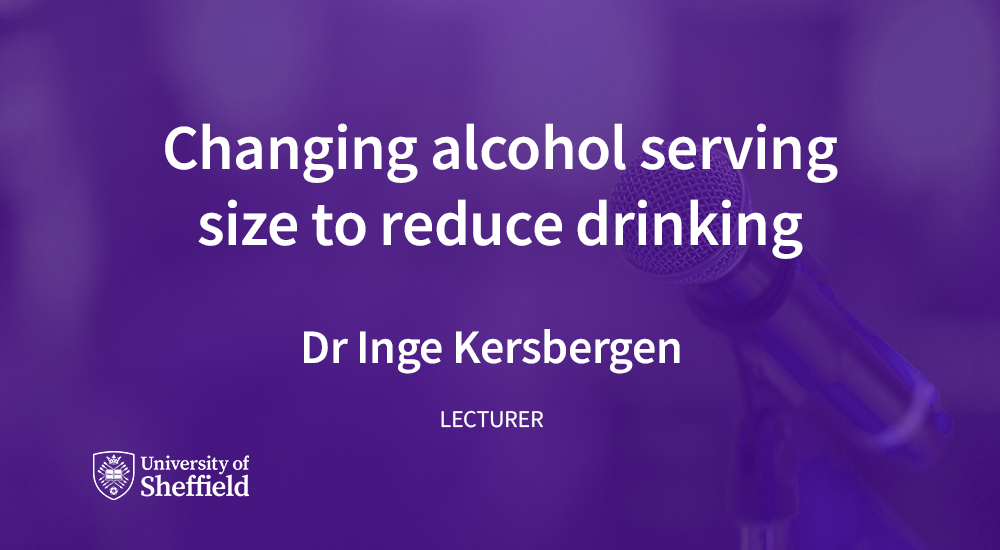Dr Inge Kersbergen to present Mini Master Class

Lecturer and SARG team member Inge Kersbergen will present an online master class on 'Changing alcohol serving size to reduce drinking' in December.
The free online session will take place on Tuesday 12 December from 1-2pm as part of a series of Mini Master Classes in Health Research from the Sheffield Centre for Health and Related Research (SCHARR) at the University of Sheffield. The series explores a wide variety of topics in the changing world of public health research.
About the Master Class
Alcohol-related health and social problems place a major strain on the NHS and social services. Some of the most effective interventions to reduce alcohol consumption are those that do not require drinkers to be motivated to change behaviour. A promising avenue for exploration are so-called "serving size" interventions, which try to lower consumption through modifying glassware or packaging.
Dr Kersbergen will present findings from a three-year Society for the Study of Addiction-funded fellowship in which she investigated how interventions that target the serving size of shop-bought alcohol might affect alcohol consumption. She will also discuss the potential for future interventions as well as possible barriers to intervention effectiveness.
Dr Inge Kersbergen
Dr Inge Kersbergen is a Lecturer in the Division of Population Health and a member of the Sheffield Addictions Research Group. She has a background in Psychology and Behavioural Science. Her research focuses on how drink and meal characteristics (e.g., warning labels, product size and alcohol/calorie content) influence alcohol consumption and dietary behaviour. She is also interested in how people use self-directed efforts to reduce or quit drinking.
Register to attend
The Master Class is free to attend but participants are asked to register in advance. Further information about the session and a registration form are available on Ticket Tailor.
-
New research shows that spending less on tobacco, gambling and sweets is good for the UK economy
A new study from the Sheffield Addictions Research Group (SARG) has found that public health policies which reduce spending on harmful products can actually provide a significant boost to UK jobs and the wider economy.
-
SARG researcher Dr Parvati Perman-Howe secures NIHR Career Development Award
We are delighted to announce that Dr Parvati Perman-Howe, a Research Associate within the Sheffield Addictions Research Group (SARG), has secured a highly sought-after Career Development Award.
-
Professor John Holmes contributes to major new report outlining actions to tackle alcohol harm
SARG Director Professor John Holmes was part of an expert panel that supported the development of 'A Healthier Future: A long-term vision to tackle alcohol harm in the UK', a significant new report published by the Institute of Alcohol Studies (IAS) this week.
-
SARG researchers present on economic modelling and wastewater surveillance at European Public Health Conference
Two researchers from the Sheffield Addictions Research Group (SARG), Dr Charlotte Head and Dr Esther Chanakira, will showcase innovative local-level tools for policy design, including economic modelling and wastewater surveillance, at the European Public Health (EPH) Conference in Helsinki from 11–14 November 2025.
You might also be interested in…
-
Policy Research Unit in Addictions
NIHR Policy Research Units (PRUs) undertake research to inform government and arms-length bodies making policy decisions about health and social care. The units create a critical mass of experts for research in priority areas for health and social care policy.
-
STAPM
The Sheffield Tobacco and Alcohol Policy Modelling Platform (STAPM) research programme aims to identify and evaluate approaches to reducing the harms caused by tobacco and alcohol consumption. By providing policymakers with evidence-based insights, STAPM seeks to improve public health policymaking and commissioning.
-
Youth Drinking in Decline
The Youth Drinking In Decline (Y-DID) project aimed to provide the most detailed analysis to date of the nature and drivers of recent reductions in alcohol use among 11-24 year-olds in England.
